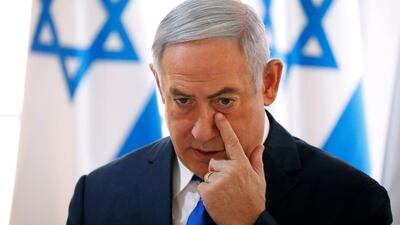The Palestinians are prepared to engage in dialogue with any future Israeli leader, foreign minister Riyad Al Maliki said on Wednesday, the day after general elections in Israel ended in deadlock.
"Whoever will be able to form a government, we are ready to sit with him or her in order to restart the negotiations," Mr Al Maliki told reporters after the elections ended in a tie between prime minister Benjamin Netanyahu and his main challenger Benny Gantz.
Mr Al Maliki is accompanying Palestinian President Mahmud Abbas on a two-day visit to Oslo.
Their trip comes ahead of a meeting next week in New York of the Ad Hoc Liaison Committee of donors to the Palestinians, headed by Norway.
The tied vote in Israel raised the prospect of tough negotiations to build a unity government or even the end of Mr Netanyahu's long rule.
Sources in Mr Netanyahu's office told AFP he was cancelling a planned trip next week to the UN General Assembly due to the "political context" in Israel.
Mr Al Maliki on Wednesday reiterated the Palestinian Authority's insistence on a two-state solution for peace, after Mr Netanyahu's deeply controversial campaign pledge to annex the Jordan Valley in the occupied West Bank.
The plan, which would cover around a third of the territory, would not annex Palestinian cities such as Jericho, but they would effectively be surrounded.
UN Secretary General Antonio Guterres warned that the plan would violate international law, with his spokesman saying: "Such steps, if implemented... would be devastating to the potential of reviving negotiations and regional peace, while severely undermining the viability of the two-state solution."

